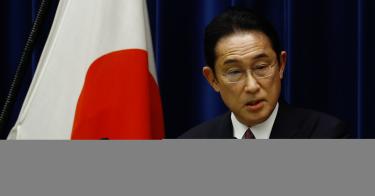Russia’s invasion of Ukraine is a brutal reminder that authoritarian countries may wreak violent havoc on their smaller, democratic neighbors at any time.
For China, that means Taiwan. And Japan increasingly sees the potential for it to be drawn into a U.S.-China conflict over the island.
China’s increasing military pressure against Taiwan has already spurred Tokyo to risk Beijing’s wrath by issuing increasingly bold public statements of support for Taipei. There is a new senior-level willingness to more directly align Japan’s national interests with protecting Taiwanese security, even hinting at military support during hostilities.
These statements represent a significant evolution in Japanese foreign relations, but it remains unclear whether they also reflect a change in policy. Tokyo may have changed rhetorically, but not yet operationally. There likely remain significant differences among what Japan can do, what it implies it will do and what it will do.
The United States would play the predominant role in responding to a Chinese attack on Taiwan. But Washington could not effectively come to Taiwan’s defense without the use of U.S. forces located in Japan as well as significant Japanese logistic and operational support.
>>> Beijing’s Problem With the Truth
To effectively respond to Chinese aggression against Taiwan, the United States would need Japan to quickly grant permission to allow American forces to operate from bases in Japan as well as determine the roles and missions its Self-Defense Forces would conduct. This would require a rapid decision by the prime minister and quick approval by the Cabinet and legislature. Whether the habitually slow Japanese decision-making process could respond expeditiously during a crisis is in doubt.
A Japanese decision would be hindered by constitutional, legal and political constraints as well as face public resistance to altering the status quo. While the populace approves of Japan’s stronger statements of support to Taiwan, that does not mean it advocates the country to adopt a more offensive security posture or assume a greater security role in the region.
Japanese agreement for intervention risks making U.S. bases in Japan, as well as Japan itself, targets of Chinese attack. However, refusal by Tokyo would undermine the ability of the U.S. to respond effectively to a Chinese attack on Taiwan. If Japan stood by idly when its forces could have protected U.S. territory or forces from deadly attack, it could do irreparable damage to the U.S.-Japan alliance.
To counter a related Chinese threats to its remote southwest islands, Japan has acquired new military capabilities. It has built new facilities, deployed new units, augmented others, improved amphibious warfare capabilities, increased air and sea mobility and enhanced command and control capabilities for joint and integrated operations.
Prime Minister Fumio Kishida advocates increasing the nation’s defense budget beyond its traditional level of 1% of gross domestic product and augmenting the country’s missile defenses. He also stated that Japan should consider building a missile-strike capability against Chinese and North Korea missile targets to be implemented in response to initial attacks. These initiatives are consistent with the country’s growing regional security role.
The Kishida administration indicated it would revise Japan’s 2013 National Security Strategy and 2018 National Defense Program Guidelines and Medium Term Defense Program. These forthcoming documents should more comprehensively discuss the importance of Taiwanese security to Japan’s national strategic interests, delineate Japan’s security strategy and identify procurement requirements to enable sufficient crisis responses.
A Taiwan contingency could unfold quickly. Military operations require planning, practicing, redeployment and logistical replenishment. An effective allied response requires rapid policy decisions and implementation. A crisis is not the time to begin assessing legal response parameters or determining organizational responsibilities. Delays in implementing operational plans can have deadly or even disastrous effects.
U.S. policymakers should engage with Tokyo to remove political impediments to action and coordinate military contingency plans and develop common operational concepts. Washington should articulate its expectations of Japan’s roles while Tokyo should define the operational measures it is willing to take—and not take—in defense of Taiwan.
Tokyo should take steps to expedite Japan’s habitual slow decision-making in the event of a crisis befalling Taiwan. It would also be useful to pre-brief members of Parliament on potential courses of action, the legal authorities for doing so and the repercussions for Japanese security and its alliance with the United States if Tokyo were to eschew support for defending Taiwan. Some of these briefings could be done by bilateral SDF and U.S. Department of Defense teams.
>>> Don’t Let Putin’s War in Ukraine Damage U.S.-India Ties
Japan and the United States should expand ongoing bilateral discussions and operational planning. Involvement should not be limited to both countries’ militaries. The discussions and planning should be done on a whole-of-government basis across ministries, agencies and departments. Bilateral contingency exercises testing agreed upon plans will also be needed to identify necessary decision points, unclear lines of authority and potential shortfalls and impediments to rapid implementation. Both nations can then take steps to remedy the problems revealed during the exercises.
Japan’s rhetoric and actions on assuming a larger security role in the Indo-Pacific have been positive and significant. Tokyo’s willingness to condemn Chinese belligerence and advocate for solidarity with Taiwan are commendable. Japan’s economic response to Russia’s invasion of Ukraine was rapid and forceful, portending a similarly robust reaction to Chinese action against Taiwan.
For the near term, Japan will maintain strategic ambiguity, as does the United States, on whether and to what degree it would defend Taiwan. It is not expected that Tokyo would make fundamental, formal changes in either diplomatic relations or security policies toward Taiwan.
But, unfortunately, in Japanese policymaking, the prologue to effective coordination with the U.S. often lasts an exceedingly long time. The alliance must start from now to convince Beijing every day that “today is not the day” to try to take Taiwan.
This piece originally appeared in The Japan Times



